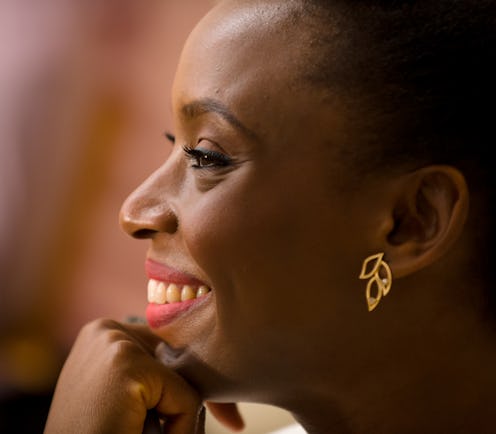Books
Chimamanda Ngozi Adichie Talked With Zadie Smith

If you haven’t yet been utterly captivated by the writing of authors Chimamanda Ngozi Adichie and Zadie Smith, I recommend you head to your nearest bookstore immediately. Adiche, winner of the National Book Critics Circle Award for her novel Americanah , has become known for her witty and poignant, no-holds-barred prose, and strong female protagonists. Smith, whose novel On Beauty won the Orange Prize, writes with a sense of humor so painfully true you’ll almost feel guilty for laughing out loud. Plus, both of these amazing women writers have been recognized for publishing their first novels at enviably young ages.
Last week, amid equal parts laughter and great applause, authors Adichie and Smith sat down with the New York Public Library Podcast’s live studio audience, in the NYPL Schomburg Center for Research in Black Culture, and talked candidly about (among many other things) writing, race, feminism, and love. Their observations on the absurdity of American culture — the ironies, successes, and failures — are uncommonly spoken aloud, refreshingly honest, and so very funny. After hearing them speak you’ll definitely want to read (or, you know, reread) everything they’ve ever written.
Here are a few of my favorite highlights from NYPL’s latest podcast, featuring Chimamanda Ngozi Adichie and Zadie Smith.
On Writing
- “The kind of writing that I like to read is writing that is clear. I think it's very easy to confuse something that's badly written as something that's somehow deep. If something is incomprehensible and the sentences are bad, we're supposed to say, 'Oh that's really deep.' It's not the kind of fiction I like to read.” —Chimamanda Ngozi Adichie
On Race
- “When I came to the U.S. I started thinking about race in a way that I had never thought about race in Nigeria ... It’s race as an identity. Growing up in Nigeria I had read Roots. I knew I was black, or that I came from a group called 'the negroes.' I mean, I knew that because I knew it intellectually … but it’s very different to come to the U.S. and to realize you're something else called 'black,' and that there are so many assumptions made because of this something else that you are.” —Chimamanda Ngozi Adichie
- “Here, even if [the strong black identity] has been created in defense, or in response, there is so much that is beautiful in it, and so much that feels strengthening.” —Zadie Smith
On Strong Women
- “What really appealed to me in this book [Americanah] was the sense of a position of an argument, and particularly of women who have not even a moment’s doubt about speaking their mind, which I think is quite unusual in American fiction … But the women in your fiction are somehow always themselves. They're always confident.” —Zadie Smith
- “The idea of a woman being strong, and simply being strong, not to prove anything and not to be unusual, is normal to me.” —Chimamanda Ngozi Adichie
On Sex and Feminism
- “It took me a while to realize I really didn't like the Mills & Boon format, where the man decides. The destiny of the relationship is in the hands of the man; and it's okay if they [a couple] meet and don't like each other, and then he grabs her at some point and she melts. You know that idea that a woman can't own her sexuality, can't own her choices? So [my writing] is the anti-Mills & Boon in many ways. The women in my world don't have to wait because they're women.” —Chimamanda Ngozi Adichie
- “Maybe it’s that difference that Alice Walker pointed out so many years ago between 'feminine' and 'womanist': the idea of not being something that’s just passive, waiting to be taken, but something that acts in the world.”—Zadie Smith
On Immigration
- “I think there is a narrative that America likes to tell itself, which is that all immigrants should be terribly grateful to have come and should therefore shut up and not complain. And you know, there are many good things about America but it’s not perfect, and people have trouble adapting, and adjusting, and some people want to go home.” —Chimamanda Ngozi Adichie
On Love in America
- “There’s a version of American love that I don’t need. There’s a kind of American love where people just are not really connected … You can be in love in this country and still be expected, if you go out, to individually pay for your own food. Right? I come from a culture where love means when you all go out one person pays for everyone, and the next day one person pays for everyone else. But in the U.S. even if you're in love you're like: ‘now did you have the calamari?’” —Chimamanda Ngozi Adichie
- “Maybe we could think of it not just as literal romance between white and black people but as a kind of radical philosophical idea. Instead of just tolerating your neighbor you love them. You don't have to move in with them, marry them, and have children, but you find a way to love them.” —Zadie Smith
Image: Howard County Library System (3), David Shankbone, Sarah Sosiak /flickr